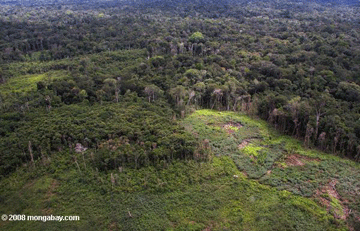|
|
Norway will provide financial support for Guyana’s ambitious plan to conserve its rainforests, reports the Guyana Chronicle.
Meeting in Oslo, Norway on Tuesday, Guyana President Bharrat Jagdeo and Norwegian Prime Minister Jens Stoltenberg signed a Memorandum of Understanding agreeing to establish a partnership to reduce greenhouse gas emissions from deforestation and forest degradation (REDD). The leaders will push for the incorporation of a REDD mechanism that includes low deforestation countries like Guyana in a post-2012 climate change agreement.
“We agreed that if the world is to prevent irreversible climate change, it is essential that greenhouse gas emissions from deforestation and forest degradation are drastically reduced, given that deforestation and forest degradation currently cause about one fifth of the global emissions,” said the statement. “To achieve this vital objective, they agreed that determined and concerted action is needed. They emphasized that efforts under the UNFCCC towards Reduced Emissions from Deforestation and Degradation (REDD) efforts must be properly designed to ensure that deforestation is significantly reduced in countries where it is already occurring, and avoided in countries where deforestation rates are still low.”
 Small-scale deforestation in neighboring Suriname |
Prime Minister Stoltenberg said REDD “would provide funding for provide funding for a shift away from forest-dependent employment and income generation, towards support for the creation of low carbon development and low deforestation economies.”
Norway’s financial commitment was not specified, although the statement noted that the Scandinavian country “is prepared to provide performance-based, substantial and sustained compensation for the progress Guyana makes in limiting emissions from deforestation at low levels and further decreasing forest degradation”
“In cooperation with Guyana and its multilateral partners, this will include contributing to the development and implementation of the necessary strategies and reforms, capacity building, and developing, funding and implementing suitable low-carbon and adaptation investments,” the statement said.
The effort will include the establishment of a “reputable international organization” to distribute funds for low-carbon development based on Guyana’s performance.
President Jagdeo welcomed the deal.
“The developing and the developed countries must work together to address global warming. I commend the government of Norway for showing leadership through its climate and forest initiative,” stated Jagdeo.
Norway has pledged up to 3 billion krone (currently $430 million) per year to reducing emissions from deforestation and forest degradation in developing countries. It has already committed up to $1 billion to Brazil’s Sustainable Amazon Fund provided the South American country meet targets for reducing deforestation.

Markets could save rainforests: an interview with Andrew Mitchell
(08/17/2008)
Markets may soon value rainforests as living entities rather than for just the commodities produced when they are cut down, said a tropical forest researcher speaking in June at a conservation biology conference in the South American country of Suriname. Andrew Mitchell, founder and director of the London-based Global Canopy Program (GCP), said he is encouraged by signs that investors are beginning to look at the value of services afforded by healthy forests.

Investing to save rainforests
(04/02/2008)
Last week London-based Canopy Capital, a private equity firm, announced a historic deal to preserve the rainforest of Iwokrama, a 371,000-hectare reserve in the South American country of Guyana. In exchange for funding a “significant” part of Iwokrama’s $1.2 million research and conservation program on an ongoing basis, Canopy Capital secured the right to develop value for environmental services provided by the reserve. Essentially the financial firm has bet that the services generated by a living rainforest — including rainfall generation, climate regulation, biodiversity maintenance and carbon storage — will eventually be valuable in international markets. Hylton Murray-Philipson, director of Canopy Capital, says the agreement — which returns 80 percent of the proceeds to the people of Guyana — could set the stage for an era where forest conservation is driven by the pursuit of profit rather than overt altruistic concerns.
Private equity firm buys rights to ecosystem services of Guyana rainforest
(03/27/2008)
A private equity firm has purchased the rights to environmental services generated by 371,000 hectare rainforest reserve in Guyana. Terms of the deal were not disclosed, but the agreement is precedent-setting in that a financial firm is betting that the services generated by a living rainforest — including rainfall generation, climate regulation, biodiversity maintenance and water storage — will eventually see compensation in international markets.